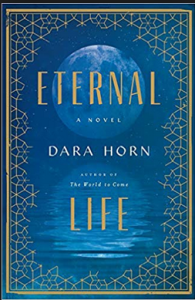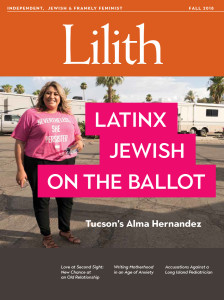The Lilith Blog 1 of 2
December 13, 2018 by Helene Meyers
7 Jewish Feminist Highlights of 2018
I don’t need to tell readers of Lilith that parts of this year have been soul-crushing for Jewish feminists. In 2018 we mourned those massacred at the Tree of Life synagogue in Pittsburgh, and many of us gnashed our teeth about antisemitism in our own feminist movements.
But Jewish feminist hope, grit, and creative resistance were also part of 2018. As the secular year winds down, let’s remember and celebrate all that has healed and nourished our souls. Here’s my annual list of 7 Jewish feminist highlights (7 being the number associated with creation and blessing in Jewish tradition):
1- Rising strong after Pittsburgh
Only hours after 11 elders of the Squirrel Hill Jewish community were murdered, a group of Pittsburgh high school students, mostly young women, met at a local Starbucks and organized a Havdalah vigil that over 3000 Jews and non-Jews attended. Rather than giving in to the fear that antisemitic violence strives to sow, these students affirmed the strength of Jewish and interfaith community. Yasher koach to Sophia Levin, Isabel Smith, Peyton Klein, Marina Godley-Fisher, Rebecca Glickman and Emily Pressman.
2-Celebrating RBG
2018 has been a banner year for celebrations of Justice Ruth Bader Ginsburg’s inspiring career, ethical vision, and general bad ass being. Ruth Bader Ginsburg: A Life by Jane Sherron de Hart hit bookstore shelves in October. Julie Cohen and Betsy West’s documentary, RBG, has received accolades, including a Critics’ Choice Documentary Award. And I’m guessing many a Jewish feminist will be lining up on December 25th to see the biopic On the Basis of Sex (I look forward to the post-movie, post-dim sum twitter debates about Felicity Jones as RBG; I’m trying really hard to withhold judgment).
career, ethical vision, and general bad ass being. Ruth Bader Ginsburg: A Life by Jane Sherron de Hart hit bookstore shelves in October. Julie Cohen and Betsy West’s documentary, RBG, has received accolades, including a Critics’ Choice Documentary Award. And I’m guessing many a Jewish feminist will be lining up on December 25th to see the biopic On the Basis of Sex (I look forward to the post-movie, post-dim sum twitter debates about Felicity Jones as RBG; I’m trying really hard to withhold judgment).
3-A film and director to watch
Paula Eiselt’s debut film 93Queen is a smart, subtle depiction of Hasidic feminist activism. It chronicles the successful fight by Judge Rachel “Ruchie” Freier and Yocheved Lerner to establish Ezras Nashim, a female EMT unit complementary to Hatzalah, the volunteer EMS organization that serves Jewish communities but doesn’t admit women into their ranks. The making of this documentary also represents a Jewish cinematic victory: thanks to the persistence of Eiselt and producer Heidi Reinberg, this “kosher film” secured support from, among others, PBS, Sundance, and Women Make Movies. Eiselt is a director to watch, and the production history of the film provides hope that observant Jewish women on-screen can become more than tiresome, pernicious stereotypes.

And video in 2018 also brought us Barbra Streisand’s music video “Don’t Lie to Me” (one of the songs on her new album Walls). Such Babs-style resistance to Trumpian mendacity is part of the venerable Jewish feminist tradition of talking back and speaking truth to abusive power.
4-An eternal novel
Dara Horn’s Eternal Life is my top Jewish feminist literary pick for 2018 (and I’m not the  only one who admires this novel: The Washington Independent Review of Books named it one of their “50 Favorite Books of 2018”, and it also earned a spot on the New York Times’ “100 Notable Books of 2018”). Eternal Life follows Rachel through the centuries; her life extends from Roman-occupied Jerusalem through a 21st-Century America of gene-mapping and blockchain. This exquisite novel is about motherhood, Jewish history, and a lover who is both soulmate and immortal stalker. And in the non-fiction category, I want to give a shout-out to Joyce Antler’s Jewish Radical Feminism: Voices from the Women’s Liberation Movement, which should be on every Lilith reader’s shelf.
only one who admires this novel: The Washington Independent Review of Books named it one of their “50 Favorite Books of 2018”, and it also earned a spot on the New York Times’ “100 Notable Books of 2018”). Eternal Life follows Rachel through the centuries; her life extends from Roman-occupied Jerusalem through a 21st-Century America of gene-mapping and blockchain. This exquisite novel is about motherhood, Jewish history, and a lover who is both soulmate and immortal stalker. And in the non-fiction category, I want to give a shout-out to Joyce Antler’s Jewish Radical Feminism: Voices from the Women’s Liberation Movement, which should be on every Lilith reader’s shelf.
5-Shattering the glass ceiling
Rabbi Hara Person shattered a Jewish organizational glass ceiling when she was named CEO of the Central Conference of American Rabbis (CCAR), the Reform movement’s rabbinical group. As the first woman to hold this position, Person is looking forward to “positive modeling, not only for our female colleagues, but also for our male colleagues to see a different kind of leader.” Having led the CCAR’s taskforce on women’s experiences in the rabbinate for the past year, she is well-equipped to structurally support diverse rabbis and the multiplicity of careers paths they follow in the 21st- century rabbinate.
6-Electoral love
 Jewish women experienced some real electoral love in the 2018 midterms. As JTA reported, 11 of the 100 women elected to the Senate and the House are Jewish. Newcomers include Elaine Luria (2nd House Congressional District, VA), a former US Navy Commander, and Jacky Rosen, who will be a newbie Senator from Nevada after having served as a synagogue president and congresswoman.
Jewish women experienced some real electoral love in the 2018 midterms. As JTA reported, 11 of the 100 women elected to the Senate and the House are Jewish. Newcomers include Elaine Luria (2nd House Congressional District, VA), a former US Navy Commander, and Jacky Rosen, who will be a newbie Senator from Nevada after having served as a synagogue president and congresswoman.
At the state level, Alma Hernandez made Arizona history by becoming the first Mexican American Jew elected to the state legislature.
7-#MeToo hits the Jewish World
Scholar of intermarriage Keren McGinity bravely wrote about American Jewry’s #metoo problem and included her own experiences in academic Jewish Studies. Hannah Dreyfus, an investigative reporter at New York Jewish Week, followed up with an exposé of sociologist Steven M. Cohen. He allegedly sexually harassed McGinity and many others during his long career as not only a scholar but also a communal influencer. Not denying the accusations, Cohen resigned from his professorship at Hebrew Union College-Jewish Institute of Religion as well as from his position as director of Stanford University’s Berman Jewish Policy Archive. McGinity and Dreyfus have once again proven the power of breaking the silence and a free press. And in 2019 and beyond, the rest of us need to repair the world of those harassed as well as question the authority of those who serve as gatekeepers of Jewish identity.
Helene Meyers is Professor of English and McManis University Chair at Southwestern University in Texas. The author of three books, most recently Identity Papers: Contemporary Narratives of American Jewishness, she is currently at work on a project about Jewish American movies. Her more journalistic work has appeared in Lilith, Tablet, Forward, Ms. Magazine Blog, the Washington Independent Review of Books, the Chronicle of Higher Education, and Inside Higher Education. Find her on Twitter: @helene_meyers.
The views and opinions expressed in this article are the author’s own and do not necessarily reflect those of Lilith Magazine.
 Please wait...
Please wait...
